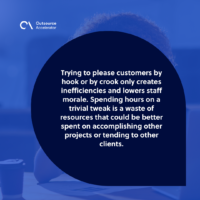Is the customer always right?
The saying “the customer is always right” is a flawed principle that fosters unhealthy business relationships and breeds entitlement.
JPMorgan Chase CEO Jamie Dimon has admitted to “firing customers” because of their bad behavior towards his employees. He said he would rather spend time and energy on clients who actually want their services.
While Dimon comes from the financial industry, unpleasant customers are present in every segment. Delivering what their customers want seems a clear-cut goal. But the process is sometimes marred by misunderstandings between the two parties.
Overdemanding customers can be challenging to deal with. Businesses fear that failing to meet their patrons’ needs will damage their company’s reputation and could potentially result in financial losses. What was meant to be a great business collaboration could turn into a sour relationship.
The origins
The adage “the customer is always right” is widely credited to twentieth-century London retailer Harry Gordon Selfridge, as he lived in a period when merchants often sold defective goods, low-quality items, or counterfeit products. In an effort to distinguish himself from the dishonest bunch, Selfridge sought to build trust and confidence with his customers.
The adage has various interpretations. Others claim that “the customer is always right” means businesses should keep track of their clients’ needs, preferences, and priorities in order to remain competitive. Some businesses have incorporated the saying into their mission statement as a constant reminder for their employees to behave professionally in front of clients.
A business relationship
Among all the interpretations, the emphasis on customer superiority has been widely accepted and implemented. This has prompted customers to make unrealistic demands, often outside the parameters of the agreement. They feel that just because they’re shelling out money, they have the right to have their wishes granted regardless of circumstances.
Trying to please customers by hook or by crook only creates inefficiencies and lowers staff morale. Spending hours on a trivial tweak is a waste of resources that could be better spent on accomplishing other projects or tending to other clients.
Companies must understand and accept that customers are sometimes wrong. Being empathetic with clients is essential, but there are times when businesses must take a firm stance to ensure efficiency is achieved. Saying no is not rude. It’s merely honoring the agreed-upon terms of the deal.
There are times when excessive requests are rooted in the customer’s lack of knowledge of the consultant’s services. As experts in the matter, it is the consultant’s responsibility to patiently educate their clients and patiently explain the project’s frameworks.
Businesses must not be afraid to say no to customers, especially when they do not seem to respect the commercial contract. Success hinges on working with clients who respect a business’s expertise and process. It’s through building these long-lasting relationships that a business can improve and safeguard its reputation.
The question for your business
How do you deal with demanding customers?




 Independent
Independent





















